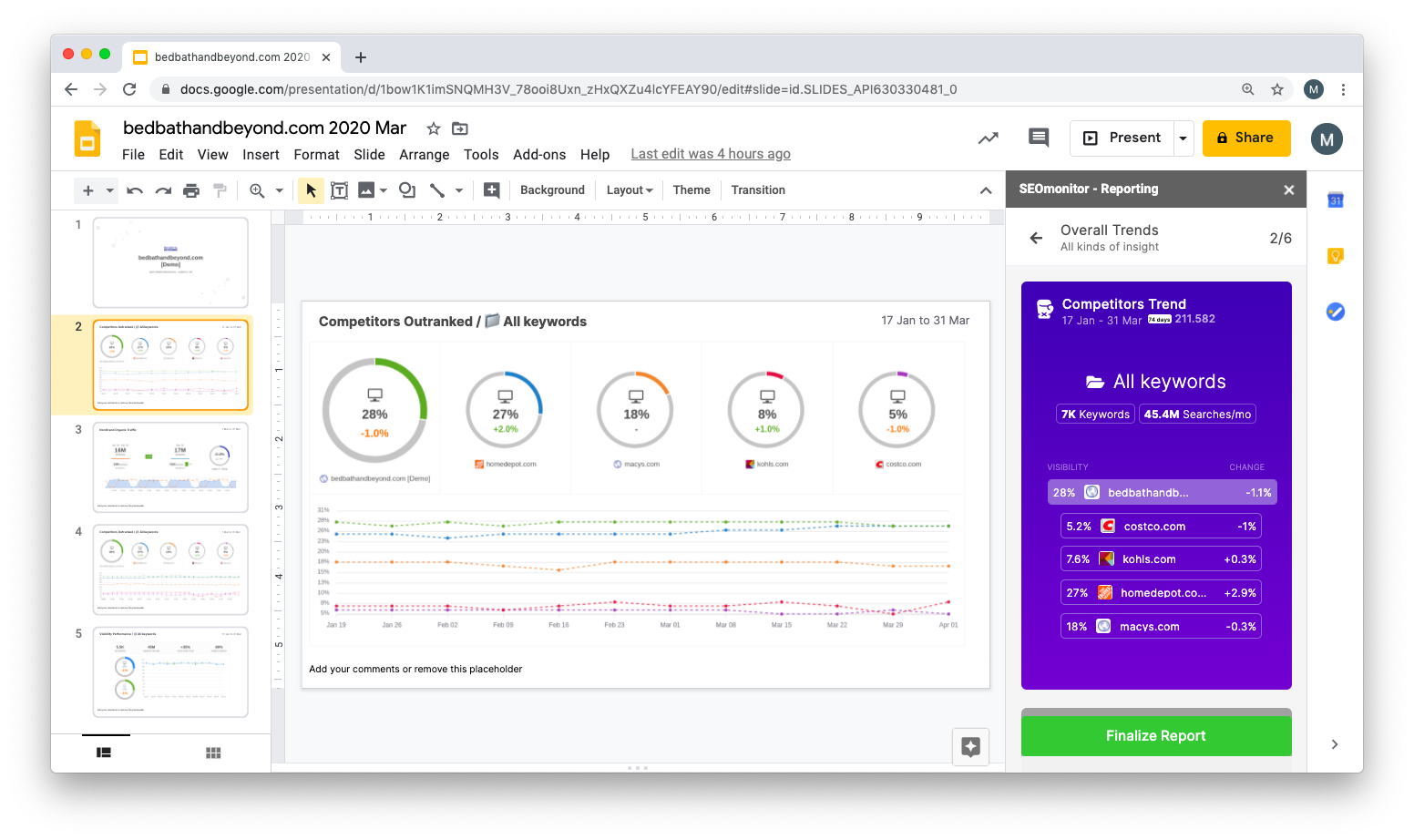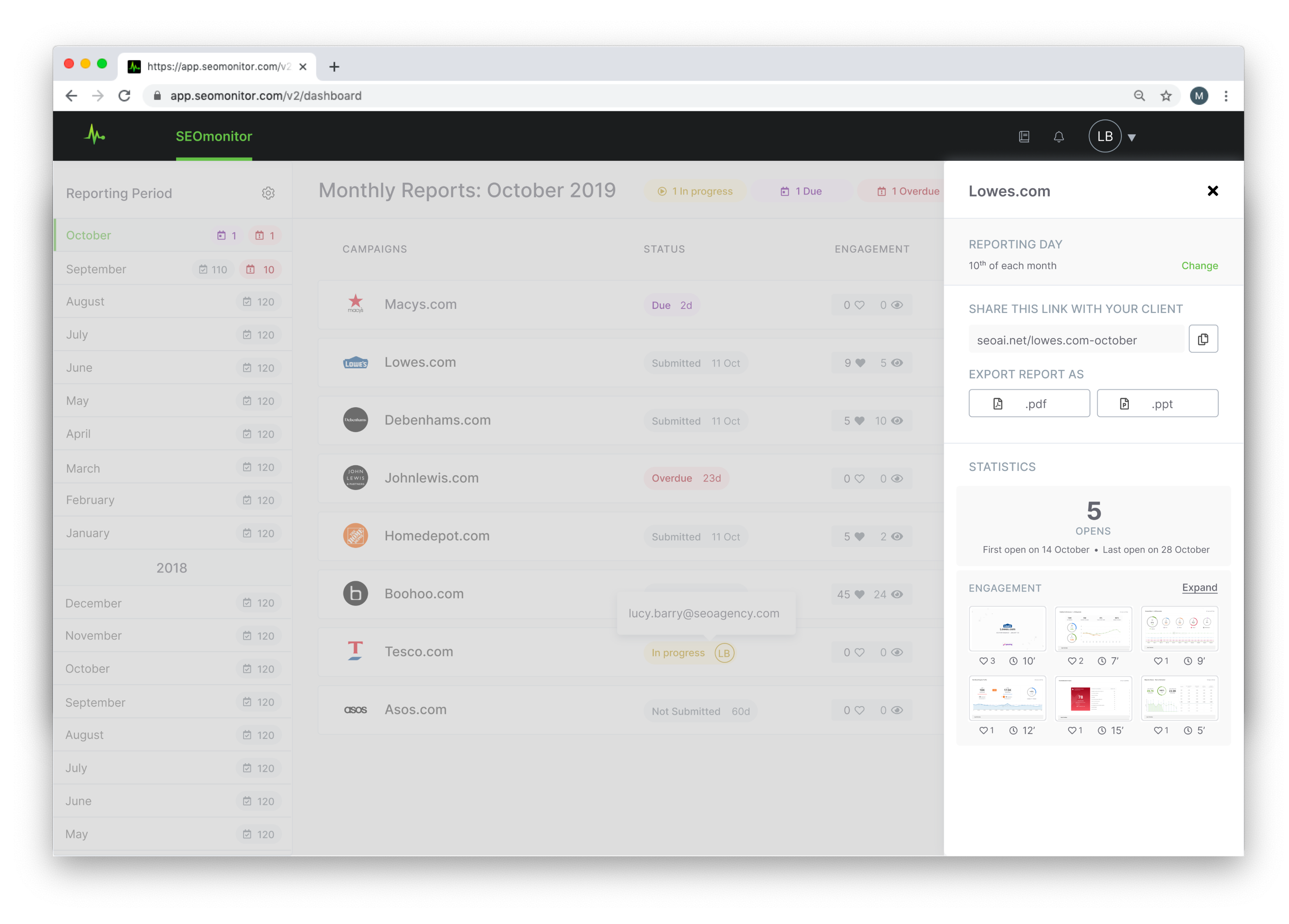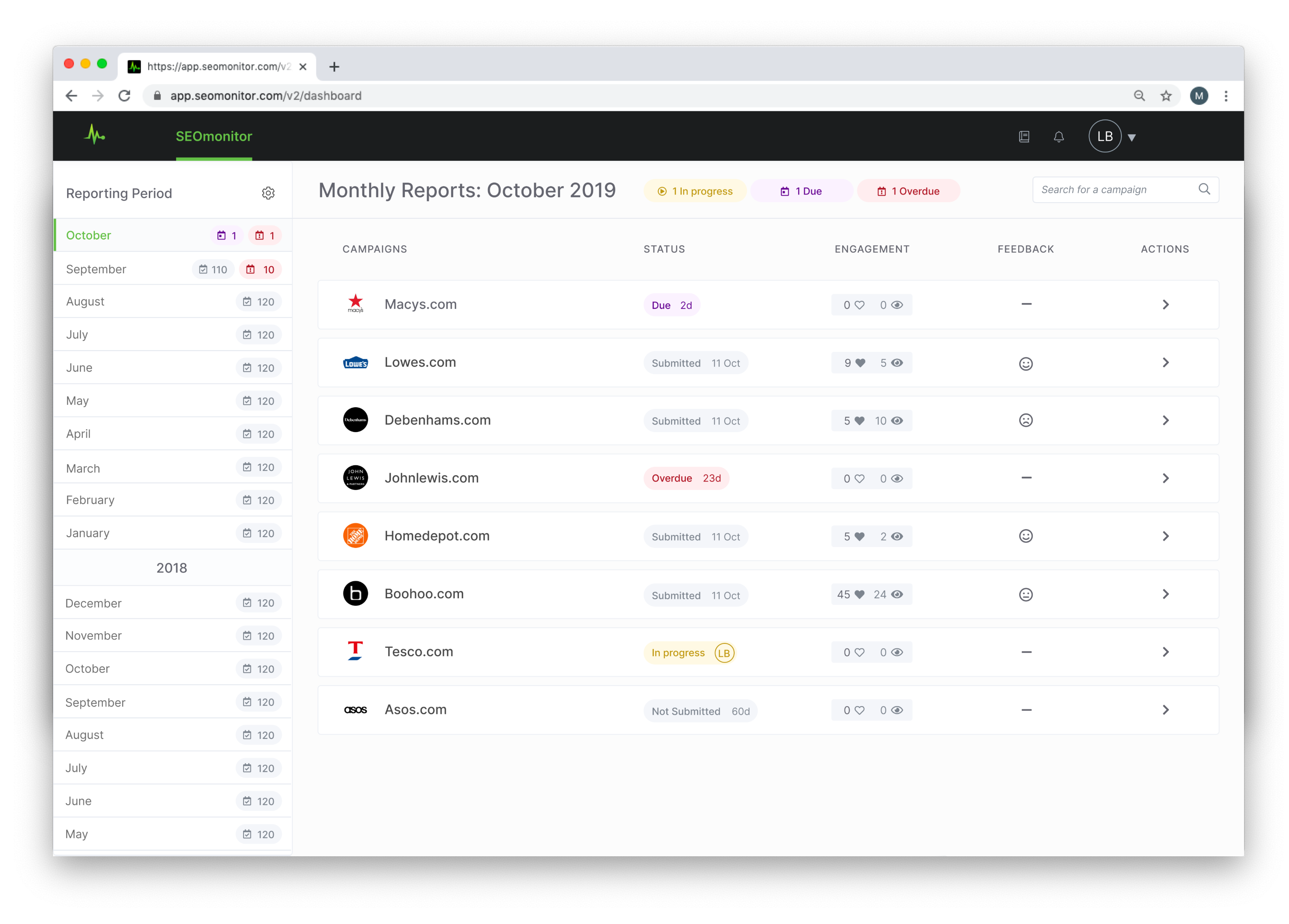
Agency Client Retention: It Isn’t Enough to Perform via @seomonitor
Let’s explore more about what you need to take into account:
Beyond the ‘Put a Reminder in My Calendar’
Building a process inside your SEO agency is always a challenge and in case of reporting, it isn’t just about reminders set in your calendar to do them monthly.


The first step is to align the team. You should answer some important questions:
- Why do we report?
- When do we report?
- How do we do it?
- What data goes in and where do we get that information?
- Who is responsible?
- When should we escalate?
- Etc.
Then assign internal responsibility.
Think about:
- Who is responsible for what client.
- Who gathers the data.
- Who creates the reports and how often.
Maybe you need to have a discussion to clarify reporting expectations with your client.
Or perhaps you have an internal dashboard where you can set up clients, their account managers and SEO specialists, and a specific timeframe, which is usually monthly.
You need to have a clear goal in mind.
Your goal? Having the client read and understand the report.
If the client doesn’t engage with it, it’s a missed opportunity.
Make sure you send them on time.
Here is where a calendar, a project management tool, or an agency dashboard again comes in handy.
The team needs to be aware of the day they should send the report, as agreed with the client – probably at the end of the month.
Then, have a set of notifications beforehand, so as to have a few days available to compound insights and prepare the document itself.
Present your report in a client meeting.
Ideally, it should be presented by your account manager for that client or the person in charge of their campaign.
This is a must in order to tell the story behind your SEO results, explain each main idea, highlight the business impact, and get client feedback.
It is what effective communication is all about: clarity, transparency, and a constant feedback loop so that expectations are met and the client is happy, while the agency is showcasing progress.
This process requires iterating and testing how it works for your teams and how you can make it better by learning from each new iteration.
Beyond the ‘Print Screen’: What’s in an Efficient Report?
Now, part of designing the process of reporting includes designing the report as well. Its content is just as important in showing the SEO results that tie into business KPIs.
Focus on the Important Monthly Insights
An aspect that can be misleading is the data quantity needed for the report. You don’t have to include every keyword, SEO action, technical update, etc. that you worked on.
What is key is to highlight the most important results and victories on KPIs like non-brand organic traffic and visibility trends. You can break it down by areas of focus and groups, and connect them with what you have done as an agency during the reported time for effective communication.
You should include major updates that affected the SEO campaign if that’s the case, content performance and how they all connect with the SEO objective set at the beginning.
An executive summary from the onset will help your clients scan through the most relevant messages you have for them.
You can also think about segmenting the report based on:
- Monthly actions and tasks that obtained relevant SEO wins.
- Group Visibility and key ranking changes in the last month.
- Competitors’ insights and how the client fares against them.
- SEO opportunities and issues that need attention at the moment.
When not performing well, all the small victories and trends could do the job, projecting optimism and helping the client understand that you do your work, but there are new challenges you encounter. If they understand, they will usually be patient and supportive.
Don’t go cherry-picking these insights.
Show what works and what doesn’t, explain the context and connect the dots so your client gets the full picture. You can also include hypotheses and some ideas or next steps to further tackle them.
Make sure you also pinpoint the actions that correlate with the current business outcomes and measure that against your forecast.
Always translate in clear sentences what each piece of data included in the report means and why it’s relevant.
Optimize for Time
We know it takes hours, sometimes quite a lot, to create a good monthly report. But it doesn’t have to.
What you can do to make it more efficient, in terms of time spent and research volume needed, is to save data as an ongoing process. You can also create email alerts or use tool integrations and benefit from having a process of curating the relevant insights from the get-go.
Think about solutions that allow you to predefine templates, and structure your data in visually appealing ways while automating certain types of data extraction, for instance.
You, thus, keep control of your input and create reports that have a clean design and are easy to read.
Don’t forget about branding, and create a unitary design style for all your client reports across the agency.
SEOmonitor’s newly launched reporting system for SEO agencies helps you with all of the above.
Having a Google Slides assistant integration, it automatically finds your best campaign insights that you can include in your monthly report, generating the slides with a single click.
We aimed to optimize for time and answer a specific job to be done: quicker and more effective reports for better client communication.


Present Competitors’ Insights
It’s important to have a benchmark and show your clients their performance trend against their competitors.
That can help them understand your SEO work, and their improving status, even if it doesn’t yet fully translate to business results.
After all, SEO is a marathon and that’s a good way of presenting it.
It can also be a signal that their competitors are heavily investing in SEO and this can be an opportunity to make new adjustments in the strategy or budget allocation.
Highlight New Opportunities & the Next Technical / Web Development Tasks
Another important aspect of the monthly reporting is that it acts as a call to action.
Maybe you discover new keywords that should be considered for their SEO strategy, maybe there’s a content opportunity to tackle.
Proactively showing an understanding of their business landscape is another good tactic to manage a good client relationship.
Don’t be afraid to talk about context and what isn’t working as planned. Also, don’t shy away from reminding your client about technical tasks that need to be resolved on their side. Or add new tasks on the pipeline.
Good communication comes from presenting all the relevant data with confidence and transparency while being solution-oriented. Both when it’s time to get on the next level of your SEO campaign, and when SEO results and forecasts aren’t in complete alignment.
Reporting Is Retention
In the end, we can say that the better the report, the better the retention.
We all know that reports don’t always get the same attention as other types of work, sometimes getting postponed for various reasons, sometimes not being read, or maybe not properly understood.
That’s why, on the flip side, they can become your hidden opportunity to take the client’s “pulse”, talk to them in their own language and further develop your collaboration.


No More Silent Clients on Client Feedback & Engagement
After designing an actionable report, the ideal way to go about it is by creating the premises to collect your client’s feedback on it. Earlier, we talked about monthly meetings as part of a solid reporting process.
But first, you need to make sure to send it beforehand, giving them time to read it and prepare questions for the meeting.
If a meeting is not possible, a call would be the next best thing.
It’s important to gather client feedback, address any concerns, clarify the significance of data and what you’ll be doing next.
Also, you should think about a way to track and measure that client’s feedback and engagement with your agency, so you really know if they are satisfied.
It may be a solution to include analytics for your monthly reports in your agency dashboard or find a way to know when and if your reports are being read.
Or gather all the feedback and create a periodic sentiment analysis to see if you’re standing more toward the positive or the negative.


After all, good engagement with your monthly reports means a good engagement with your client.
And if a client doesn’t interact with your reports, you know there’s an issue to address there or you’ll see it in your churn rate later on.
Summary
Monthly reporting is a critical cog for your SEO agency processes.
It’s also a process on its own and a productive moment to reengage your clients and build a good rapport for long term results.
- Design a reporting process for your SEO agency taking into account internal responsibility from your team, a structure to ongoing gather data and always send them on time, and a habit of monthly client meetings for debriefing. Iterate until you have a fully working process.
- Create a visually appealing monthly report that highlights the most relevant SEO insights: actions and tasks, rankings statuses, competitors insights, SEO issues and opportunities, and next steps.
- Optimize time spent creating the report with templates and semi-automated data collection. Streamline your monthly reporting design.
- Present new SEO opportunities and use the monthly report as the best moment you have to take the client’s “pulse” and further build your relationship.
- Correlate monthly client engagement with client retention and strive for effective and constant communication. You’ll definitely improve retention and create a good communication process for your team and your clients.
We thought a lot about this process and after consulting with SEO agencies about their needs, we launched a solution to make monthly reports more effective and the process more efficient.


With our Reporting board you get an integrated reporting system for your SEO agency:
- An overview of all your reports for the last full month and their status (Due, Overdue, Submitted, In Progress) in a designated dashboard.
- A Report builder with a Google Slides smart assistant that automatically generates top insights that you can choose from and insert with one click. We’ll also generate the slides for you! All you need to do is customize your agency brand elements, and add annotations and explanations for your selected insights.
- A feedback tracker with engagement data for each monthly report to get your client’s “pulse”: which slides the client engaged the most, which were most liked and the overall satisfaction of your client, collected just as they finished reading your report.
The reporting system that we developed is part of our SEO agency solutions, designed to help you acquire, manage, and retain more customers.
Join us, and hundreds of SEO agencies clients, in the journey of bringing more transparency and measurability to the SEO industry.
Click here for a trial that doesn’t ask you for a credit card, but gives you full access to the platform.





